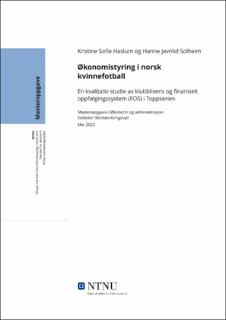| dc.contributor.advisor | Kringstad, Morten | |
| dc.contributor.author | Haslum, Kristine Sofie | |
| dc.contributor.author | Solheim, Hanne Jevnlid | |
| dc.date.accessioned | 2022-09-16T17:20:06Z | |
| dc.date.available | 2022-09-16T17:20:06Z | |
| dc.date.issued | 2022 | |
| dc.identifier | no.ntnu:inspera:112632672:114289698 | |
| dc.identifier.uri | https://hdl.handle.net/11250/3018591 | |
| dc.description.abstract | Kvinnefotballen er i rivende utvikling både nasjonalt og internasjonalt. Interessen har tatt seg opp, og publikumsrekorder blir knust. Den økonomiske situasjonen har blitt bedre for norske kvinneklubber, men har en lang vei å gå. Det finansielle oppfølgingssystemet (FOS) ble innført i 2012 for Toppserien. På dette tidspunktet var økonomien svak, men i dag har kvinnefotballen fått mer likviditet. Det er svært lite forskning på økonomistyring innenfor kvinnefotball og hvordan klubbene benytter det finansielle oppfølgingssystemet og lisenskriterier. I herrefotballen har FOS vært et positivt system som har bidratt til å forbedre økonomien og vi ønsker å undersøke om dette også er tilfelle i norske kvinneklubber der økonomien er svakere. Vi utformet følgende problemstilling:
Hvordan brukes det finansielle oppfølgingssystemet og klubblisenskriterier i økonomistyringen i norsk kvinnefotball?
Vi benyttet kvalitativ metode for å besvare problemstillingen og har gjennomført syv dybdeintervju. Studien avdekket flere interessante funn. Et funn er at det er varierende målkonflikt mellom sport og økonomi, men graden av konflikt er situasjonsavhengig. Kvinneklubbene tar hensyn til klubbøkonomi til tross for at sportslige mål blir prioritert, noe som kan ha sammenheng med økt fokus på økonomistyring. Budsjettbegrensningen i klubbene setter en stopper for pengebruken og sportsavdelingen kan dermed ikke alltid gjennomføre sine ønsker. Klubblisensen kan ha bidratt til å styrke økonomifokuset mellom sportslig og økonomisk avdeling. Et annet funn er at FOS i liten grad blir brukt internt til annet enn rapporteringen til NFF. Et tredje funn er at klubblisenskriterier kan styrke forhandlingskraften for klubber med kommunalt anlegg for å få godkjent infrastruktur. Dermed kan klubbene henvise til kravene som en må oppfylle for å kunne konkurrere i Toppserien. Klubber som er i en fusjonsprosess med herreklubber kan benytte seg av godkjent infrastruktur og innarbeide rutiner, som vil medføre en sportslig- og økonomisk fordel. Kvinneklubbene ønsker at FOS skal tilpasses mer mot dagens økonomiske situasjon. | |
| dc.description.abstract | Women’s football is growing rapidly, both at a national and international level. The interest for women’s football is increasing and spectators records are being broken. The economic capacity of Norwegian women’s football clubs has improved but still have a long way to go. The Financial Regulating System (FOS) was implemented in 2012 for the Norwegian football league “Toppserien”. At this point, the economic capacity of women’s football clubs was weak, but has since achieved greater liquidity. There is very little research on the economic administration of women’s football and how the Financial Regulating System and club licence is being utilized. In men’s football FOS has been a positive system that has contributed to improving the economy and we want to investigate whether this is also the case in Norwegian women's clubs where the economy is weaker. We formulated the following thesis question:
How is the Financial Regulating System (FOS) and requirements for club licenses being employed in the economic administration of Norwegian women’s football?
In order to answer the problem formulation, we used qualitative methods and completed seven in-depth interviews. The study resulted in several interesting findings. Firstly, there is varying conflict of interest between athletic ambitions and economic goals, and the degree of conflict depends on context. Women’s football clubs consider the economic situation of the club even though athletic goals are generally prioritized, which might relate to the increased focus on financial administration in clubs. Limitations on budgets in clubs prevent excessive spending, which sometimes means the athletic departments are not able to do what they want. Club licences may contribute to increase the focus on economic administration across the athletic and economic departments of clubs. Secondly, FOS is rarely internally employed for other purposes that to report to NFF. Thirdly, approval criteria for club licenses may be employed as a pressure method to make clubs with government-owned facilities get approved infrastructure. In this way, clubs may refer to the qualification criteria that need to be fulfilled in order to compete in “Toppserien”. Women’s football clubs that are being fused with men’s clubs can get access to approved infrastructure and thorough routines, which may lead to economic and athletic benefits. Women’s football clubs want FOS to be more adapted to the current financial situation. | |
| dc.language | nob | |
| dc.publisher | NTNU | |
| dc.title | Økonomistyring i norsk kvinnefotball - En kvalitativ studie av klubblisens og finansielt oppfølgingssystem (FOS) i Toppserien | |
| dc.type | Master thesis | |
